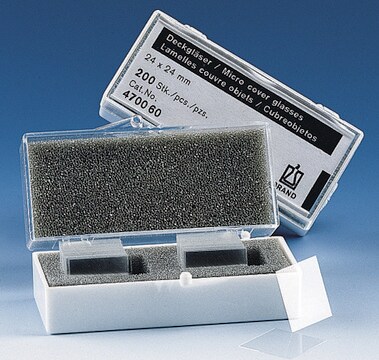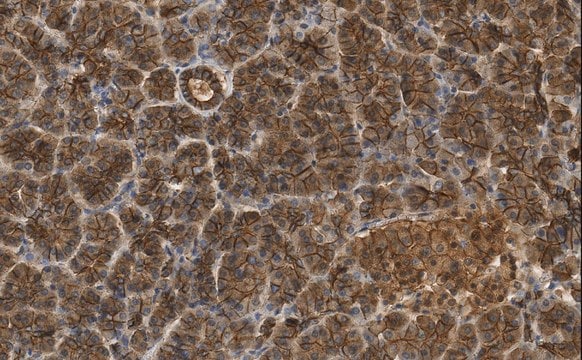일반 설명
We are committed to bringing you greener alternative products, which adhere to one or more of the 12 Principles of Green Chemistry. This antibody is preservative-free, produced without the harm or sacrifice of animals and exceptionally stable to allow for ambient shipping and storage if needed, and thus aligns with "Waste Prevention", "Designing Safer Chemicals" and "Design for Energy Efficiency".
Click here for more information.
ZooMAb® antibodies represent an entirely new generation of recombinant monoclonal antibodies. Each ZooMAb® antibody is manufactured using our proprietary recombinant expression system, purified to homogeneity, and precisely dispensed to produce robust and highly reproducible lot-to-lot consistency. Only top-performing clones are released for use by researchers. Each antibody is validated for high specificity and affinity across multiple applications, including its most commonly used application. ZooMAb® antibodies are reliably available and ready to ship when you need them.
특이성
Clone 2G11 is a ZooMAb® rabbit recombinant monoclonal antibody that detects AMH/MIS. It targets an epitope within 15 amino acids from the C-terminal half.
면역원
KLH-conjugated linear peptide corresponding to 15 amino acids from the C-terminal half of human AMH/MIS.
애플리케이션
Quality Control Testing
Evaluated by Western Blotting in mouse testis tissue lysate.
Western Blotting Analysis: A 1:1,000 dilution of this antibody detected AMH/MIS in mouse testis tissue lysate.
Tested Applications
Western Blotting Analysis: A 1:1,000 dilution from a representative lot detected AMH/MIS in mouse ovary tissue lysate.
Immunofluorescence Analysis: A 1:100 dilution from a representative lot detected AMH/MIS in human ovary tissue sections.
Immunohistochemistry (Paraffin) Analysis: A 1:100 dilution from a representative lot detected AMH/MIS in human ovary tissue sections.
Affinity Binding Assay: A representative lot of this antibody bound with AMH/MIS peptide at least ten thousand-fold (10,000X) higher than with the non-specific control peptide.
Note: Actual optimal working dilutions must be determined by end user as specimens, and experimental conditions may vary with the end user.
표적 설명
Muellerian-inhibiting factor (UniProt: P03971; also known as Anti-Muellerian hormone (AMH), Muellerian-inhibiting substance, MIS) is encoded by the AMH (also known as MIF) gene (Gene ID: 268) in human. AMH/MIS is a glycoprotein belonging to the transforming growth factor-beta (TGF-β) superfamily. It is composed of two identical subunits linked by disulfide bonds. AMH plays a critical role in sexual differentiation by promoting the regression of the Müllerian ducts during male embryonic development, preventing the development of female reproductive structures such as the uterus and fallopian tubes. In females, AMH is involved in the regulation of folliculogenesis and ovarian function. It inhibits the initial recruitment of primordial follicles and decreases the sensitivity of growing follicles to follicle-stimulating hormone (FSH). AMH is primarily expressed in the Sertoli cells of the testes in males and the granulosa cells of ovarian follicles in females. In males, AMH expression begins during fetal development and continues until puberty, after which it decreases. In females, AMH is expressed from birth and throughout reproductive life, with levels peaking during early adulthood and declining with age. Abnormal AMH levels and signaling are associated with various reproductive disorders. In males, mutations in the AMH gene or its receptor can lead to persistent Müllerian duct syndrome (PMDS), characterized by the presence of female reproductive structures in otherwise normal males. In females, altered AMH levels are linked to conditions such as polycystic ovary syndrome (PCOS), premature ovarian insufficiency (POI), and infertility. AMH is also used as a biomarker for ovarian reserve and is measured in clinical settings to assess reproductive health and predict the onset of menopause. This ZooMAb® recombinant monoclonal antibody, generated by our propriety technology, offers significantly enhanced specificity, affinity, reproducibility, and stability over conventional monoclonals.
물리적 형태
Purified recombinant rabbit monoclonal antibody IgG, lyophilized in PBS with 5% Trehalose, normal appearance a coarse or translucent resin. The PBS/trehalose components in the ZooMAb formulation can have the appearance of a semi-solid (bead like gel) after lyophilization. This is a normal phenomenon. Please follow the recommended reconstitution procedure in the data sheet to dissolve the semi-solid, bead-like, gel-appearing material. The resulting antibody solution is completely stable and functional as proven by full functional testing. Contains no biocide or preservatives, such as azide, or any animal by-products. Larger pack sizes provided as multiples of 25 µL.
재구성
Reconstitute lyophilized antibody pellet with 25μL of ultrapure water or Phosphate Buffered Saline (PBS). Please refer to our
reconstitution protocol and the specific application guidance on the suggested starting dilutions and sample type.
저장 및 안정성
Recommend storage of lyophilized product at 2-8°C; Before reconstitution, micro-centrifuge vials briefly to spin down material to bottom of the vial; Reconstitute each vial by adding 25 µL of filtered lab grade water or PBS; Reconstituted antibodies can be stored at 2-8°C, or -20°C for long term storage. Avoid repeated freeze-thaws.
법적 정보
ZooMAb is a registered trademark of Merck KGaA, Darmstadt, Germany
면책조항
Unless otherwise stated in our catalog or other company documentation accompanying the product(s), our products are intended for research use only and are not to be used for any other purpose, which includes but is not limited to, unauthorized commercial uses, in vitro diagnostic uses, ex vivo or in vivo therapeutic uses or any type of consumption or application to humans or animals.










